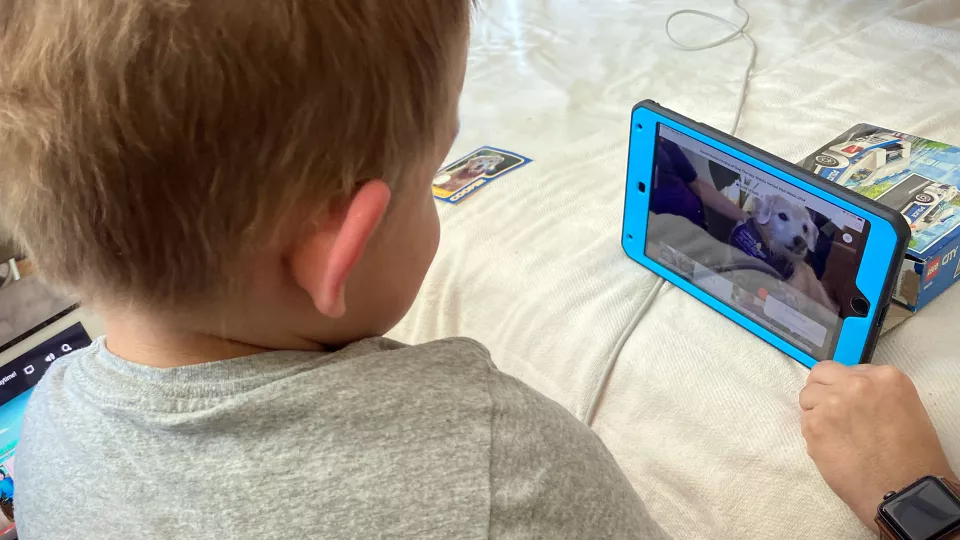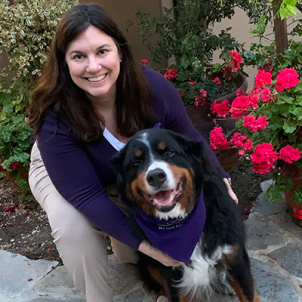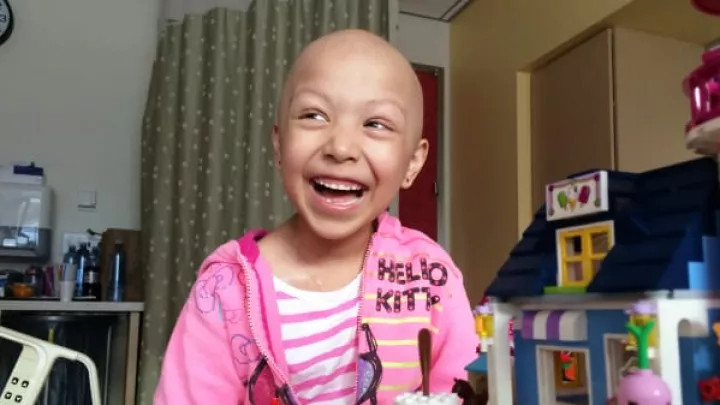
Rescue Pups
As you click “Join meeting” for your appointment, a friendly face appears. It’s smiling, nonjudgmental—and furry. Welcome to virtual dog therapy.
One of the many things that makes Children’s Hospital Los Angeles so special is The Amerman Family Foundation Dog Therapy Program. Best of all, it’s offered to everyone.
“While we are here first and foremost for the patients, we also believe in supporting the people whosupport our patients like the parents, families and our team members,” says dog therapy program manager Kate Buhrmaster.
In the past five years, the Dog Therapy Program has provided support every day, 365 days a year no matter what at CHLA. But in early March 2020, the consecutive streak appeared to be in jeopardy as the COVID-19 health crisis spread. Normally, the dog volunteer teams could visit most areas of the hospital But due to the pandemic, non-essential, non-clinical staff were asked to work remotely – including the dogs.
A pawsible solution

“Our CHLA community was anxious and we turned to innovation to help us provide something meaningful for them,” says Buhrmaster, whose team quickly developed a plan to provide virtual dog therapy and keep the streak going. Like many of their CHLA colleagues, the dogs (and their owners) learned how to do their jobs via Webex video conference calls.
For a typical visit, the video conference is pre-loaded onto a device managed by a Child Life team member, who delivers it to a patient room with the dog waiting on the other side of the screen. The device can go door-to-door on a unit to visit with interested patients, much like the dog would do in real life. Buhrmaster admits she was skeptical about how the “new normal” would be received. But her fears were put to rest the first time she witnessed a patient respond to a dog visit.
“They were oohing and aahing at their screen,” Buhrmaster says. “Then the questions started: ‘Can you scratch him behind his ears? Can you give him a belly rub for me?’ Just seeing a relaxed doggie face on the screen looking back at you does wonders.”
To date, more than 60 of the 127 trained four-legged volunteers (and their humans) have beenequipped to provide virtual therapy visits. While most of the visits are one-on-one, there areopportunities for people to interact with multiple dogs, like during the weekly “Paws and Relax” sessions. There, sometimes up to eight furry faces wait in the gallery to greet visitors – mostly staff – who log in just to take a look or interact via the video chat feature. The morale boost provided by these sessions has been well-received.
“We know we are kindof like comfort food for the hospital,”says Buhrmaster, whose Bernese Mountain Dog, Wrigley, is in the program. “We are a familiar part of the CHLA community. We let you check in, take a deep breath and have a moment to appreciate that we are all in this together even if we’re on the other side of a computer screen.”
Dogged determination
This is not the first time the program, now in its 19th year, has adapted to meet patient needs. Infection control regulations prohibit the dogs from going onto the Bone Marrow Transplant Unit where all the patients follow isolation protocols.
“People told us the thing that was going to be harder, on an& emotional level, for the patients was not having the Dog Therapy Program there. I thought ‘I can’t let that happen,’” Buhrmaster says. “We came up with the idea of doggie pen pals, where we can deliver laminated photos and letters from the dogs to the kids.”
In the five years since the visiting streak began, Dog Therapy Volunteers have facilitated 67,288 personalized, one-one-one patient visits. On average each month of the five years, dog therapy also supported more than 2,350 family members and visitors and 1,792 staff members. In total, they have had 368,341 human interactions – and counting.
“Every time a challenge comes our way and we are faced with ‘How can you help in this situation?’ we meet that challenge,” Buhrmaster says. We believe a day without a dog would be a sad day at CHLA.”


